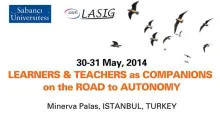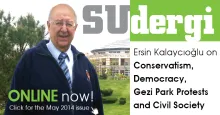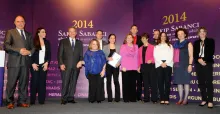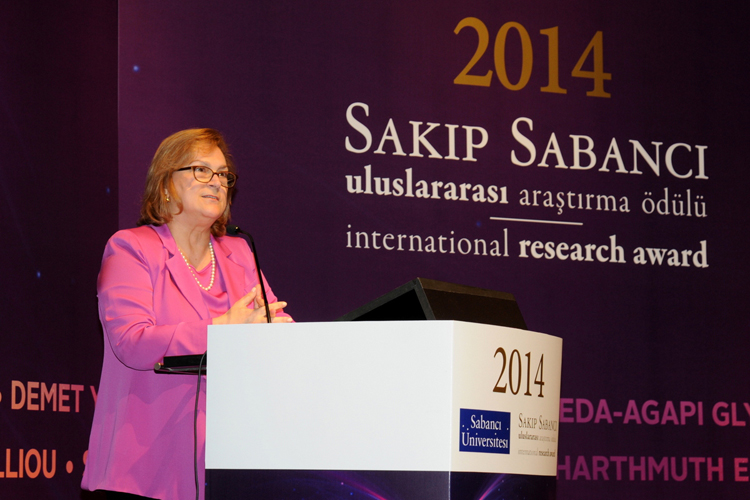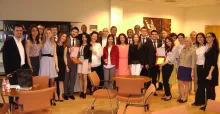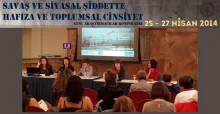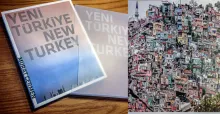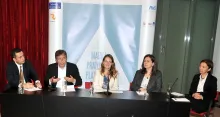
Wednesday Talks with Nesrin Balkan
Ayşe Kadıoğlu: Music is where I go beyond myself a little. You know how reason contradicts love; reason is all about weighing and measuring… It is more coolheaded, whereas love is all about losing yourself, it is free of bounds. Music is love for me.
I love listening to rock by women. Heart is a great band, for instance. I go back to it every now and then. I like Joan Jett, Janis Joplin, and from the distant past, Suzi Quatro. I love Paula Cole’s music too.

Thinking about motherhood and music, I realized something: when you are young, you want people to love you; you feel as if that’s the most important thing. But then I realized –maybe I as maturity kicked in– that being loved is great and all, but what really matters is to love.
You are a mother, a professor and a political scientist. How does being a DJ factor in?
That’s what I want to be when I grow up. I want to be a DJ.
And I wanted to be a singer.
I played a few times and it was as if I awoke a monster from its slumber. I played on Açık Radyo. It was great fun, I loved it. In fact, I started dreaming about doing a radio program. I prepared extensively beforehand of course; I said a few thing between tracks. I started off with rock by women, then it was jazz, blues, chansons, all sung by women. There’s a Nancy Sinatra song that goes “These boots are made for walking, that’s just what they’ll do, one of these days these boots are gonna walk all over you.” That will be my signal music. In fact, there is a part in the song that says, “Are you ready boots? Start walking” – maybe that’s how it should start. The show could be called Women’s Boots. I’d really like to do a show like that when I have the time. The short lectures between tracks had a feminist discourse to them; in fact I did a show on March 8th. I had started that show by saying “March 8th isn’t an oh so sweet day that you give flowers to women and celebrate together, don’t confuse it with Valentine’s Day. March 8th is a political day.” The slogan was “private is political.” I have a large number of CDs that keep growing as I buy more. I had some of them transferred to my computer. I have lots of music from the past, that is, my youth. Recently I’m obsessed with Nina Simone and I keep listening to her over and over again, enjoying every time.

I read about Nina Simone’s life, and that was an interesting occasion. I recently took up the habit of reading in bookstores. I read Nina Simone’s life in a bookstore too.
It makes sense to skim over a book in a bookstore but reading it through as if you were in a library was strange indeed.
That was during my sabbatical in Oxford. You get a little lonely, that’s how sabbaticals are. You have people that you work with during the week, but on the weekend I didn’t have my son or Erdağ with me, so I visited bookstores in Oxford. I saw a book about Nina Simone’s life at the music bookstore in Oxford, and I started to read it. Over several weekends I met that book at the bookstore like it was my friend, settled in a couch to read it, and slipped out for a cup of coffee every now and then, coming back to it later. The people working there realized that I was coming there every weekend to read the book. It’s not that I didn’t want to buy it; reading it there appealed to me more.
It’s a different experience.
I was interested in Nina Simone. She marries a detective; it is passionate love at first, but then he starts physical abuse. How should I put it? She’s a woman with weaknesses. The book illustrated perfectly how human it is to have weaknesses.
I love Nina Simone’s music. I love Tina Turner too, who was similarly abused.
Yes, she is a fighter too.
She is an astonishing woman. I listen to the music of these women, knowing about their lives. I love listening to rock by women. Heart is a great band, for instance. I go back to it every now and then. I like Joan Jett, Janis Joplin, and from the distant past, Suzi Quatro. I love Paula Cole’s music too; her lyrics are poetic and instruments are excellent too. I get spirited away when I listen to blues guitar; I don’t hear anything else in the song. I sometimes pick out individual instruments when I listen to music.

It seems like music is quite a large part of your life.
Music is where I go beyond myself a little. You know how reason contradicts love; reason is all about weighing and measuring…
Being detached…
It is more coolheaded, whereas love is all about losing yourself, it is free of bounds. Music is love for me. I have been thinking on the similarity of music to love. I can’t listen to music while I work, for instance; listening to music needs to be separate ad dedicated. I can’t work or do something else while listening to music.
Music should be the main thing, not something on the side.
Yes. Having music play in the background as I read or write isn’t for me. I can read in cafes or loud places, but I need silence if I am to write. If a piece of music I love is playing in the background, there is no way for me to read, I get carried away to the music. I can pick that music up even in a great racket. I could probably work if elevator music was playing, but I’d rather it didn’t. Some people work with music – I don’t have that. I listen to music before or after doing my work as a distinct experience. It’s not something I can do while I’m busy with something else.
I can’t do that either.
That doesn’t mean I don’t like music. I like it so much that I can’t let other things get in the way.
It is something you like and enjoy, so you don’t want to see it as an ancillary. What else would you like to say about motherhood?
Motherhood turned out to be very important to me. It was to my mother, and I guess you learn this job from your mother. I ended up being like my own mom.

I had tremendous fun when raising my son. He was a great kid too – he wasn’t difficult, just as difficult as the next kid. He made me very happy. He was always a good student. He smiles all the time, and is very considerate. Erdağ and I look at him and we are proud that our son became a great person. He is very successful too, but more importantly, he is a good human being.
That should be more important. Success should come second to being a good person.
Thinking about motherhood and music, I realized something: when you are young, you want people to love you; you feel as if that’s the most important thing. But then I realized –maybe I as maturity kicked in– that being loved is great and all, but what really matters is to love. I saw a film that illustrated this perfectly. It’s called Marvin’s Room. Meryl Streep and Diane Keaton play two sisters. They have a father who is very ill. Diane Keaton plays the good child of the family, it is her who cares for their father.
Diane Keaton is ill too, I think.
Could be. And Meryl Streep has a son. Did you remember? Meryl Streep plays the rebellious child who was never on good terms with the family. There is a scene where the two sisters are talking, and Meryl Streep tells the other, “You were very lucky because mom, dad, the whole family loved you. You were always the brilliant daughter.” Diane Keaton, the good sister, thinks for a moment and replies, “Yes, I was lucky, not because they loved me though, because I loved them.” Don’t you think that’s quite important?

It is; everyone wants to be loved, but being able to love is essential.
I think that is the source of all positivity. Does this make sense?
It does. It has the power to change your whole outlook on life, how you perceive the world. Such small things can open up a vast landscape. It could be a couple of words, or a scene from a film.
I had mentioned this film in an essay I wrote after Hrant was murdered. Hrant’s greatest difference was that he knew how to love. He was always loaded with positivity. He had an enormous heart.
You are right, Hrant Dink was full of love and joy.
I remember the final scene of the film. Diane Keaton lies beside her father in the bed, and she uses a mirror to project pretty shapes and colors onto the wall.
You remember correctly; it must have moved you too.
Of course it did.
Marvin’s Room. That’s the impression of the film on me.
Any final words? How are things for you overall?
I’m good, I’m happy with my life. I have old friends who are my references; I derive my strength from them. I’m working with a great team in the faculty, and I’m very happy with that too. I also like the fact that I’m friends with most of the faculty members here, we have been working together for a very long time. We rely on each other.

My son Deniz Cihat, Erdağ, my family, close friends… These are all profound relationships. I have less and less time because of work, so I need to choose how I spend my time carefully. I try to live in a more selective way.
You opt for a more refined life without worrying too much about details.
Thank you for this great conversation.





